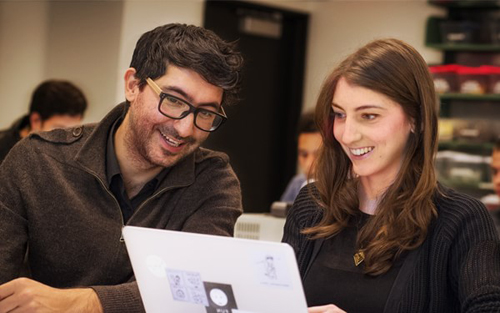Carnegie Corporation of New York Grants Carnegie Mellon $1 Million To Support Activities of the Simon Initiative
Global Learning Council, Chaired by CMU’s Subra Suresh, Releases Draft White Paper Recommending Best Practices in Technology-Enhanced Learning (TEL) and Data Sharing
By Ken Walters / 412-268-1151 / walters1@andrew.cmu.edu and Shilo Rea / 412-268-6094 / shilo@cmu.edu
The Carnegie Corporation of New York has awarded Carnegie Mellon University a $1 million, two-year grant, to demonstrate and help promote the use of technology-enhanced learning techniques in higher education.
 The grant — Carnegie Corporation’s largest ever to CMU — will allow the university to better understand and develop strategies to overcome the roadblocks to using technology-enhanced learning (TEL) resources.
The grant — Carnegie Corporation’s largest ever to CMU — will allow the university to better understand and develop strategies to overcome the roadblocks to using technology-enhanced learning (TEL) resources.
Carnegie Mellon has pioneered TEL courses that have proven faster and more effective than traditional curricula covering the same material. The university took a further step 18 months ago to strengthen its impact in TEL within CMU campuses and across the globe by establishing the Simon Initiative, a strategic, university-wide commitment to harness learning science research and the latest in technology in order to improve learning outcomes for all students. The university is also bringing other resources to bear in support of technology-enhanced learning. The first building to be constructed in the David A. Tepper Quadrangle, a major new campus facility scheduled to open in 2018, will use philanthropic support to create spaces that incorporate state-of-the-art technology designed to facilitate TEL activities across all of CMU’s Schools and Colleges.
As part of the Simon Initiative, the Global Learning Council (GLC), a consortium of academic, industry and nonprofit leaders chaired by CMU President Subra Suresh, held its inaugural meeting last fall to lay the groundwork for the promise of TEL to be realized. Since then, the council has begun to establish best practices for TEL and sharing learning data.
President Suresh has been invited to present the GLC draft white paper — including nine specific recommendations — to the Presidents of the Association of American Universities (AAU) on April 20, and to the Presidents of the Association of Public and Land-grant Universities (APLU) in June. The recommendations are also being widely circulated for discussion, comment and feedback in the higher education, technology, government and nonprofit communities, with a final release planned within a year. Marsha Lovett, Ken Koedinger, Norman Bier and David Quinn of CMU’s Simon Initiative played a critical role in developing the GLC draft white paper with input from the members of GLC.
The grant from the Carnegie Corporation of New York will allow CMU to begin implementing the GLC recommendations.
“We have several decades of research in how to build and use TEL effectively, and this research has been extremely successful,” said Richard Scheines, dean of the Dietrich College of Humanities and Social Sciences, faculty lead of the Simon Initiative and the grant’s principal investigator. "But it is clear that there are sizable barriers to wide adoption of effective TEL, some rational and some not. This grant gives us the opportunity to take this work to the next level, making these breakthrough techniques available to more students here at CMU and to learners everywhere.”
Joel Smith, distinguished career teaching professor of philosophy, is the co-principal investigator for the project.
Project participants will create a series of statistics course modules that will be used in research training courses by several of CMU’s schools and colleges in disciplines ranging from engineering to computer science to business. Carnegie Mellon School of Computer Science faculty will also create TEL modules to support teaching introductory computer science. As they are doing so, the project will also assess the type of university policies and practices needed to overcome typical institutional barriers to adoption. The work will subsequently be extended to other universities, domestically and internationally.
TEL has the potential to dramatically improve education. For example, according to a recent Rand Corp. study, high school algebra students of all backgrounds who used a Carnegie Mellon University-inspired cognitive tutor learned almost twice as much as a similar group who did not. And, students taking the Intro to Statistics online course developed at CMU learned more than traditional students, and they did so in half the time.
For more information, visit http://www.cmu.edu/simon/.
Learn more about the GLC at http://globallearningcouncil.org/.